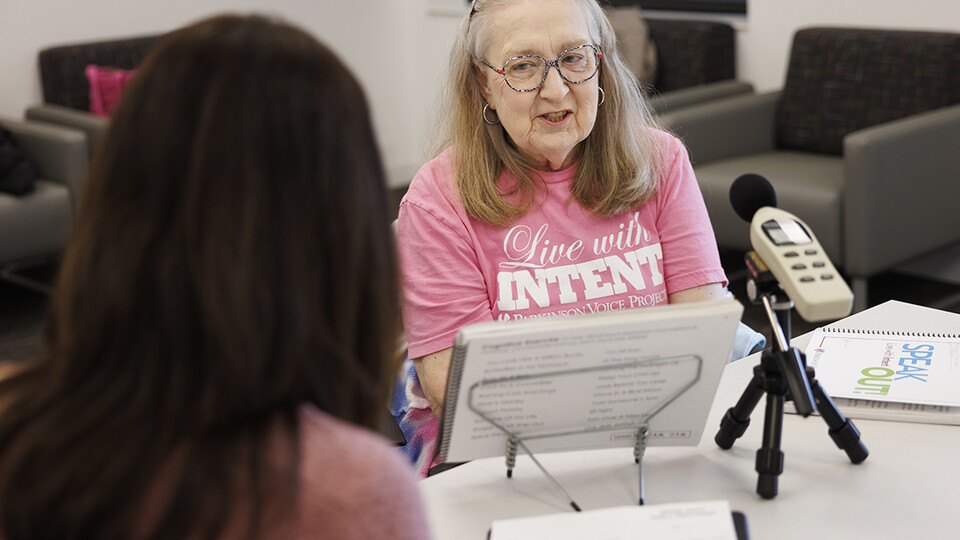
Barkley Center project helps Parkinson’s patients be heard
14 Feb 2024 By Kristina Jackson, University Communication and Marketing
Rhonda Heiserman always looks for opportunities to tell people, even strangers, about the Parkinson Voice Project.
Heiserman, who was diagnosed with Parkinson’s disease in 2017, began the project’s SPEAK OUT! voice treatment in 2020. She has become an advocate for the speech-language therapy program, frequently handing out flyers during doctor’s office appointments and recently giving information to someone she met on a plane. She’s also active in the community, presenting Parkinson Voice Project information to clubs and Parkinson’s support groups.
“I want everybody to have the same opportunity that I had,” Heiserman said. “I just think everybody deserves a chance. I want to pass the word as fast and as far as I can.”
The SPEAK OUT! treatment, offered at the University of Nebraska–Lincoln’s Barkley Speech-Language and Hearing Clinic, helps people with Parkinson’s disease improve and maintain vocal volume and clear articulation. Jessie Kohn, a lecturer in special education and communication disorders and coordinator of the therapy program, said it helps people stay connected to the world around them.
“The goal is for people with Parkinson’s to communicate well in all environments, that they can be heard, and they can get their message communicated successfully,” Kohn said.
People with Parkinson’s can develop dysarthria, a condition stemming from changes in the nervous system that can cause rigidity and weakness in the lips, tongue, throat and breathing muscles. This weakness often results in decreased volume, less variation in volume and pitch, and imprecise articulation.
The clinic received a grant to offer Parkinson Voice Project therapies in 2019, with some 40 individuals participating to date. Graduate students in speech-language pathology complete the training and assist Kohn with the programs.
The SPEAK OUT! exercises are aimed at strengthening the muscles involved with speaking and swallowing. The therapies include exercises like repeating warm-up syllables — “may, me, my, moe, moo” — sustaining an “ah” sound at high decibel levels, gliding from a low pitch to a high pitch, and reading and counting aloud.
“We’re cuing clients to increase their intention with speech, loudness, articulation,” Kohn said. “A verbal cue such as ‘Say it like you mean it’ can facilitate increased facial affect, improved loudness and articulation, so that they are easier to understand.”
Kohn said the program includes cognitive exercises to boost a participant’s focus on their voice while performing a dual-thinking task.
“It simulates when you are out in the community: You’re managing paying attention to people moving around you or pushing the shopping cart and looking for things on your list, while also talking to the person who accompanied you,” Kohn said.
The process starts with an evaluation by a speech-language pathologist. Kohn said a good candidate for SPEAK OUT! can tolerate 40-minute therapy sessions, respond well to the therapy directions and commit to daily exercises.

SPEAK OUT! is an individual therapy in which the participant meets with a speech-language pathologist for eight to 12 sessions. Once someone has completed SPEAK OUT!, they can join Lincoln Voice Warriors — a group version of the program that meets over Zoom — for maintenance.
Heiserman said the therapy has helped train her to focus on what she’s doing while she’s speaking. Parkinson’s causes a drop in dopamine levels, which affects the body’s ability to perform some functions that normally occur automatically.
“You always have to be thinking about everything you’re doing,” Heiserman said. “You have to think about what you’re going to say, say it with purpose, make sure you say it loud enough. It helped me to remind myself that I have to speak with intent.”
To warm up her voice each morning, Heiserman watches a livestream run by the program’s founder, Samantha Elandary. She also visits her mother in a care facility and sings with her as another way to exercise her voice, complementing a weekly sing-along hosted by the national Parkinson Voice Project. Heiserman said the program is a consistent way to address one of the many problems that can come with Parkinson’s.
“I’d like to be able to speak loudly and clearly, and I want to be able to swallow in 10 years,” Heiserman said.
Kohn said that while some people with Parkinson’s might be in early stages and not be experiencing speech or voice challenges yet, early intervention is key as Parkinson’s is a progressive disease.
“If we start early and we focus on helping maintain what you have, all the better,” she said. “Let’s target before it gets more difficult to regain.”
Clinicians record a video of an individual’s evaluation and another when they’re nearing the end of their program to compare their volume, articulation and facial affect.
“Oftentimes, they’re very stunned by the fact they didn’t recognize a change to their communication and can then see the end result being totally different,” Kohn said.
Along with the physical benefits she’s experienced, Heiserman said the Parkinson Voice Project connects her to others with her diagnosis, offering an opportunity to share experiences and advice for coping with the challenges of the disease. If one person is struggling with dry mouth, for example, someone else might recommend chewing gum or sucking on mints.
“You have your own little therapy group,” Heiserman said. “You can talk to other people about problems you’re having, and vice versa. It doesn’t always have to be just about speech.”
College of Education and Human Sciences
Special Education and Communication Disorders
Comprehensive Health & Well-Being